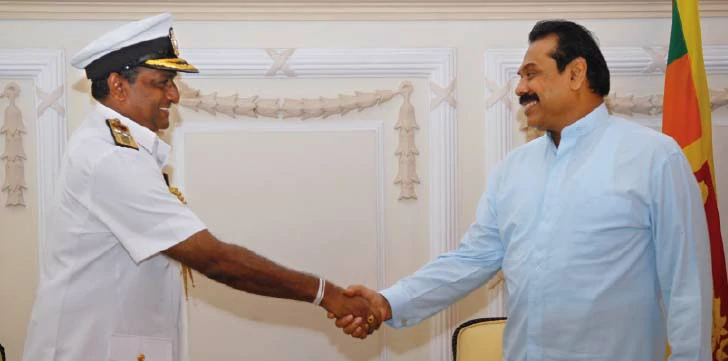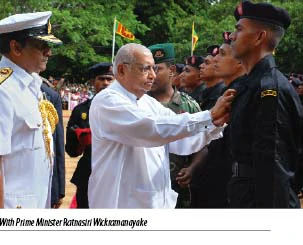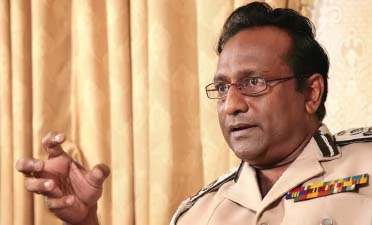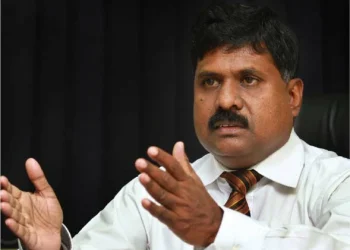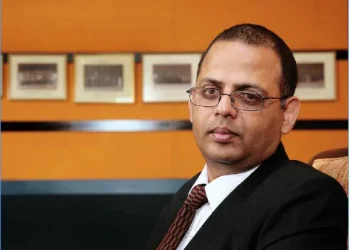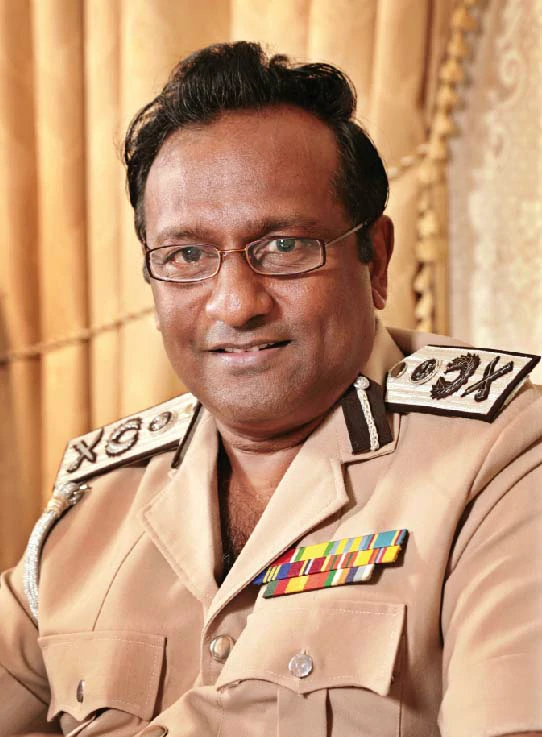
They are the protectors of the villages. They have quelled the fear that was created by the LTTE who massacred innocent villagers in threatened areas. Protecting their own villages has become part of their day-to-day lives. They lie awake at night on a constant vigil, prepared to face any threat that would harm their kith and kin. Their role in protecting the villages has released the Army to fully concentrate on the humanitarian operations. Formerly known as the Home Guards Force, the Civil Defence Force (CDF) has transformed into a Force to be reckoned with. Due to the perseverance of the CDF, villagers can carry on with their livelihoods and daily lives without having to look over their shoulders. The training and tactics of the Civil Defence Force has proven to be a deterrent to the LTTE. Resolute in his commitment to maintain the standard of the CDF through constant motivation, training and welfare, Director General of the Civil Defence Force Rear Admiral Sarath Weerasekara is the man behind the renewed strength of this Force. His 35-year long service to the Sri Lanka Navy has undoubtedly been a strength in this endeavour. Amidst numerous controversies in the past, Rear Admiral Weerasekara has remained dedicated to eliminating terrorism in Sri Lanka. This is his account of the journey of the Civil Defence Force.
By Udeshi Amarasinghe & Thilini Kahandawaarachchi
Photography by Sanka Sammana
Could you explain the concept behind the Civil Defence Force and what makes it unique?
The Civil Defence Force (CDF) was earlier known as the Home Guard Force. It was established to protect the “Threatened Villages”. As you know we don’t call them “Border Villages” because there are no borders in our motherland. These are the villages which are consistently threatened by the terrorists.
When the terrorists were storming into villages and brutally massacring the innocents, as the Army could not be deployed in each and every such village, the Home Guard Force was established in 1985 to protect the innocent unarmed villagers. At the beginning, the Home Guard Force comprised of men and women from each village who volunteered to protect their respective villages. Initially they worked without any pay or any uniform and only with a shotgun. Subsequently, it became a unit with pay and a uniform under the Police Department. However, after the 2002 ‘’Ceasefire Agreement” the importance of the Home Guard Force was comparatively reduced and there was a tendency to utilise them for various duties other than security related ones. Nevertheless, after February 2006, when the terrorist attacks on innocents resumed, the Secretary of Defence, Gotabaya Rajapaksa recommended to the President that the Home Guard Force should be reorganised, restructured with better training and deployed for the protection of the threatened villages as an independent force under the Ministry of Defence. Thus, the Civil Defence Force is the brainchild of the present Secretary of Defence. If the Civil Defence Force takes up the full responsibility of protecting the villages the Army could be relieved to engage in their primary task. I am also grateful to the Secretary of Defence for having recommended me as the first Director General of the CDF to the President. I was appointed as the Director General of the CDF whilst I was also the Chief of Staff of the Navy and I took over the post full time when I officially retired in October 2006.
When I assumed duties as the Director General of the CDF, its strength was only 19,200 personnel. Therefore, as soon as I took over, I visited all the threatened villages and conducted a thorough study with the relevant Army and STF personnel and analysed the threat scenario and the sort of attacks that have been carried out in those villages, the type and the number of Home Guards attached, the additional number required etc. The study was done in the first two months and we carried out a large-scale recruitment drive. This is how the CDF has now increased up to 41,500 personnel and I am proud to say that today all the threatened villages in the island are protected by the CDF, 80% of the Main Supply Routes and 75% of the Forward Defence Lines are guarded by the CDF. In addition to this, we also protect the major religious places such as Sri Maha Bodhiya and Dalada Maligawa and crucial economic targets such as the oil refineries etc. Hence, the CDF now contributes towards the national security very effectively under the Secretary of Defence and that is what makes this force unique.
Firstly, We Have In Our President A National Leader And Not Only A Political Leader. The Firm Political Commitment To Crush The Terrorists Emerges Only In A Patriotic National Leader. So, The First Reason For The Success Is Because We Have A National Leader With A Firm Political Commitment To Eradicate Terrorism. Secondly, We Have A Very Committed Secretary Of Defence. He Has Been A Soldier, He Understands The Battle Well, He Knows The Enemy Well And He Is Aware Of His Troops, Resources Etc. He Commands Respect From All And Inspires The Troops With His Addresses. He Is The Main Pillar Behind The Success.
As you mentioned, the concept of Civil Defence was there since 1985, but since 2006, there has been a major shift. Can you elaborate on that?
Yes, as I mentioned the Home Guard Force was established in 1985. But it was not very well organised, not properly trained, the men were not motivated and they were not much respected. That was why there were many massacres in villages despite the fact that there were 19,200 personnel. Had it been a well-organised and a well-trained Home Guard Force, many of these massacres could have been averted. That was the reason why the Secretary of Defence wanted this Force to be reorganised and fully committed to protect the innocent.
Therefore, I introduced many training courses for them including a compulsory one month basic training in our training centres under qualified Army and Navy Instructors. Their daily wage was reasonably increased. They were given a good uniform called the desert camouflage (the type worn by the US Marines) and also a normal camouflage. Thus, with all these, now they can perform their duties in a dignified manner.
With the Secretary of Defence’s approval, I have also formed a special elite unit called ‘Nandimithra’ comprising of selected four-man groups from almost all vulnerable villages. These men are given special training (the type of training given to commandos) for ten weeks and that training includes ambushes, night fighting, un-armed combat etc. They are the men who can lay in ambush in the pathways leading to villages to ambush the terrorists. This unit has become very effective and it has acted as a deterrent against terrorist attacks. Generally, our role is a defensive one and we are expected to protect the village, hold the enemy until reinforcement reaches. But Nandimithra personnel engage in a limited offensive role just outside the threatened villages. I have very clearly defined the responsibilities in protecting the threatened villages. Providing an adequate number of men to each village is the responsibility of the Director General. Performing the duty to the best of his ability is the responsibility of CDF personnel. Supervision of their work is the responsibility of the Area Security Officers, that is the Army or the STF. Observing the lapses of the village security and informing them is the responsibility of the Head Priest or the senior men in the village and attending to such lapses is again my responsibility. In this manner, I have made everyone responsible for the security of the village. This is how we protect our villages effectively and that I think is the major shift which you can observe.
What are “threatened villages” and who are “CDF personnel”?
Threatened villages were the villages adjacent to terrorist dominated areas. They included villages in Puttlam, Anuradhapura, Vavuniya, Trincomalee, Polonnaruwa, Ampara and Monaragala Districts. The LTTE as we know, infiltrate in small groups and engage in these heinous activities. Usually Chena cultivation land and paddy fields are only a few kilometres from threatened villages. People have to engage in cultivation and that is their livelihood. Therefore, regardless of the threat, there is a tendency for the villagers to go and cultivate. The CDF personnel not only guard the village but also lay in ambush around these paddy fields and Chena land and protect the farmers. However, you need to understand that we cannot have a full Force protecting all the Chena lands. That is why we hear of isolated incidents where LTTE has killed unarmed Chena cultivators. But we are trying our best to protect everyone.
With regard to the type of personnel in CDF, as we know the CDF is there to protect the villages from the LTTE. The terrorists attack only Sinhalese and Muslim villages. Therefore, we have mainly Sinhalese and Muslim personnel in the CDF.
How does the CDF protect threatened villages?
If you go to a threatened village you will appreciate the conditions they live in and the arrangements. In certain areas houses are 200-300 metres apart. That’s why we conduct an intelligence survey with area security authorities and deploy our men accordingly. Hence, in many instances we do not have static bunkers as the LTTE can then reccee it and attack as they have previously done.
Furthermore, there is a calculated number of personnel attached to each village and in most vulnerable places we have issued them with even night vision equipment. As I mentioned before, we have our Nandimithra personnel who lay in ambush just outside the village. In some villages we have also provided the civilians with shotguns. So unlike before, now the LTTE does not know which houses have weapons and which houses don’t. Therefore, that has deterred the terrorist from storming into houses to kill innocent civilians. As I said, our main task is to check the enemy, hold them till we get reinforcement. The village security plan is incorporated in the nearest Army or STF contingency security plan. This is how we protect the villages professionally.
What are the main tasks and responsibilities of the CDF?
The main task of the CDF is actually two fold. Firstly, it is the protection of the threatened villages. For that, there are 41,500 personnel under my command, both men and women including the Nandimithra group are deployed as I mentioned earlier to protect the threatened villages from the terrorists. This is how we perform our primary task of protecting threatened villages. We have been very successful and that is why we don’t hear about mass scale massacres now.
Secondly, our task is to provide an overall secure environment to ensure that the villagers do not migrate to the South. Since migration will have a detrimental effect on the National Security of the country as the terrorists can occupy the land. Now the question arises as to why people migrate to the South. Is it only because of the terrorist threat? No. For example, if there is a bomb explosion in New York, people don’t vacate the city. Similarly, if there is an explosion in London, people don’t vacate London. But, if there is an attack in Yakawewa, Kabethigollawa or Ethavetunawewa then people migrate to the South. The main reason being that, there is no social or economic security in such areas.
Hence, in addition to providing the physical protection, in order to prevent the people from migrating to the South, my responsibility also includes providing social and eco-nomic security in those villages. What are the social and economic problems they have? Their roads are in a dilapidated state; lack of qualified teachers in schools; no good pre schools; lack of facilities in hospitals; inability to sell their paddy or vegetables at a reasonable price, lack of good infrastructure and transport facilities etc. All these aspects are now being properly addressed by the government’s Jathika Saviya campaign under the supervision of Basil Rajapaksa, MP. So the CDF also supports this campaign by engaging in social and economic projects in the villages. For example, 22 Kilometres of the Kebithigollewa Road was done up by the CDF and we were able to save Rs 48 million to the Road Development Authority. The CDF has graduates and A Level qualified men and women and they are teaching in most of the schools filling the vacancies. For example, in schools in Welioya area, more than 50% of the teachers are CDF personnel. There are CDF women teaching in pre schools as well. They teach in the pre schools and after 12 pm they go to the bunkers or the checkpoints and resume their Home Guard duties. That is how the CDF contributes to the social security of the people.
We have also set up farms and have helped with self-employment. Currently, we are trying to provide them a good market for their paddy and vegetables in Colombo. If they are socially and economically established, then there is little reason for them to migrate. It is only when they have nothing to lose that they move when there is a bomb explosion or an attack. Therefore, my responsibility is to ensure that they will have many things to lose if they opt to migrate. I think we are doing well in that regard too.
The Soldier Knows The Entire Country Is Behind Him. Their Welfare Is Looked Into And A Sense Of Patriotism Prevails In The Society. The Soldier Has Become A Respected Person In The Society. They Die For Their Country. That Feeling Amongst The Soldiers Is The Key To Success.
You mentioned about protecting Major Supply Routes. Can you elaborate on how exactly the CDF does that?
Initially the Army performed this task. However, now with the Humanitarian Opera-tions, the responsibility has been given to the CDF. For example, from Trincomalee to Habarana, the route is about 54 Kilometres and about 80% of that road is picketed by the CDF personnel who live on either side of the road. Each person has a 12-hour duty roster. Firstly, they clear the road and then they picket the road right throughout the day. That is how all vehicles are now travelling without any difficulty. Similarly, there are many other Main Supply Routes in Anuradhapura, Polonnaruwa, Ampara and all of these Main Supply Routes are being protected by the CDF.
The CDF has been given the responsibility to protect the Katunayaka – Peliyagoda Road. There are 600 CDF personnel deployed and we have protected it to the best of our ability. There have not been any incidents during this period. Not only terrorist attacks but also aspects such as minor theft have stopped because of our presence.
Could you tell us a little bit about who is recruited to the CDF?
We recruit people from the respective threatened villages. Their salary is only about Rs 14,000 – 15,000 per month, which is hardly sufficient to maintain a family. Therefore, when they are in their own village, they don’t have to spend unnecessarily for their food or accommodation. When they protect their villages where their own kith and kin are, there is an additional reason for them to protect the village than an outsider. For that reason, we recruit people from each village to protect that village. Of course, for the Main Supply Routes and the Forward Defence Lines (FDL) people from other areas are deployed as we don’t find men living close to such areas. These people are given an additional allowance to compensate their expenses.
Can you tell us about the weapons that the CDF use?
Earlier we used only 12 bore shotguns but now we have sophisticated weaponry. We use T-56 guns and at times, machine guns as well though they are used very rarely. The CDF personnel are fully confident and capable of using these weapons.
As the Director General of the Civil Defence Force, how do you ensure that the CDF personnel do not misuse their powers?
That is why we focus on discipline. People misbehave when there is no supervision or when there is lack of patriotism. Patriotism is instilled in them by various types of lectures on history, national feelings etc, and also emphasising on the importance of protecting the country for the future generations. When they feel it in their hearts, they will not misuse their power. Earlier there were a lot of allegations of hunting, illicit sale of liquor, felling of timber etc. Now we lay in ambush and catch those who illegally fell timber. If a person is drunk on duty, we take strict measures. The whole idea is to protect the village, protect the motherland as well as to protect our culture. There is no purpose in winning the war if at the same time we don’t protect our culture. Winning the war and protecting the culture must go hand in hand. The CDF personnel are educated in that aspect as well. All these have ensured negative misuse of power to a greater extent.
Could you tell us about the organisation set up of the CDF? And how does the CDF work with the three Armed Forces and the Police?
As the CDF is a ground force, we work directly with the STF and the Army. I don’t have officers in the CDF; therefore I have to rely on the three Armed Forces and the Police. I am appointed as the Director General and I have an Assistant Director General Nandana Wijeratne who is a SSP. There are also a number of Police Officers for administrative purposes. The threatened villages are divided into 17 sectors and a Police Officer or an Army officer as Sector Commanders heads each sector. I must thank the Army Commander who has gone out of his way in helping me by releasing these officers. The Director of Operations is Rear Admiral Ananda Pieris who has retired from the Navy and joined the CDF. There are also Police Officers in the CDF and the Inspector General of Police has been very helpful. I have no authority to recruit officers directly so I rely on the retired officers or the officers reassigned from the three Armed Forces and the Police.
How have you personally boosted the morale of the CDF?
The morale is very important. As the Secretary of Defence always says, however sophisticated the equipment, it is the man behind the machine that matters. If the man is not in his proper mental state or morale then the outcome is not as effective. That is why in any operational service, the operation and the welfare is of utmost importance. Confidence also boosts up the morale. To boost the confidence of the CDF, we have introduced effective training. They are now professionals in the sense that they know what to do in an emergency. The training has given them confidence.
Then comes welfare. Initially the families were not paid fully when their kin were Killed In Action. After I became the Director General, the Secretary of Defence kindly consented and the President approved paying the widow of a killed Home Guard the full pay until the age of 55 as per the three Armed Forces and the Police. It is the same for personnel who are Wounded In Action and Missing In Action.
The smart uniform, a good weapon and the pay increase has boosted their morale. They also know that there is a firm political commitment to eradicate this menace and that too has largely contributed to boosting up their morale. I am very proud that all the Civil Defence Force personnel are in good morale and are confident. As you can remember, for the first time in their life and for the first time in history, the Civil Defence Force personnel were allowed to take part in the Independence Day parade and don’t ask me which contingent was the best amongst the three Armed Forces and the Police. So all these aspects have boosted the morale of the CDF.
Could you elaborate on the successes of the Civil Defence Force?
The reduced number of attacks on threatened villages itself indicates our success. Furthermore, in Wattala, one of our personnel detected a suspect with a parcel who proved to be an accomplice of a suicide bomber and through him the Police were able to trace and locate approximately 350 Kg of TNT and 17 suicide jackets. Thus, if we had not caught that person the consequences would have been very drastic. In another instance a CDF girl in Vavuniya caught the bomber who had planted the bomb in the Dehiwala train. Likewise there are so many incidents where CDF personnel have taken the initiative and apprehended many LTTE suspects. Earlier the role of the Home Guards was only to defend. Now there are many instances where we have successfully pursued the enemy. Those are our successes.
What are the reasons behind the successes of the CDF?
The main reason is the high morale and motivation. They are now professionals, being respected by the public and they know that they have become a force to be reckoned with. They have a patriotic feeling which comes from the first citizen down the line. Unlike in the past they know that they directly come under the Secretary of Defence for all their operational and other needs. All these are the reasons behind the successes of CDF.
What are the future plans of the Civil Defence Force?
Civil Defence Force is there to protect the threatened villages from the terrorists. If the terrorists are destroyed there will be no need of the CDF as there will not be any threatened villages. Around 40,000 people will lose their jobs, which might probably lead to another social impact. With that in mind we have already started various industries to contribute towards the production of the country. For example, we have started brick making industries, iron industries and farms in the villages. We have other projects in mind too. Further whoever who wants to join the Army, Navy, Air Force and the Police are given the option to do so.
For thirty years, the Sri Lankan government has been fighting against the LTTE. However, within the last 2 ½ years we have been able to defeat them. In your view, how was this possible?
Terrorism, although not defined yet by the UN for reasons unknown, is generally de-fined as “unleashing violence, or massacring innocents to achieve a political aim”. The victims include infants, pregnant women, innocent farmers etc. Therefore whether the “cause” for terrorism is justifiable or not, terrorism cannot be justified. With that preamble let me tell you that I see a number of reasons for that. Firstly we have in our President a national leader and not only a political leader. A national leader is always a patriot. He loves his motherland and he loves his people. A national leader would not wait and see whilst his people are being killed unnecessarily. The firm political commitment to crush the terrorists emerges only in a patriotic national leader. So the first reason for the success is because we have a national leader with a firm political commitment to eradicate terrorism.
Secondly, we have a very committed Secretary of Defence. He is a warrior himself and has a lot of battle victories behind him. Unlike any other previous Secretaries, because he has been a soldier, he understands the battle well, he knows the enemy well, he is aware of his troops and resources etc. Above all he is the brother of the President who can get whatever resources he requires to fight. He commands respect from all, sets an example to officers, being a teetotaller and a vegetarian and inspires the troops with his addresses. He is the main pillar behind the success.
Thirdly, we have heard the saying that war is an extension of politics by other means. Politicians decide to wage war to achieve a limited political objective. But once the war starts it is up to the Secretary of Defence and the Generals to fight the war without any political interference. This time there was absolutely no political interference, politicians never set dates and never told how to fight, what target to get and when. The Head of State gave total freedom to the Secretary of Defence to conduct the humanitarian operations in the manner they deemed fit. That was another reason for the success.
The fourth reason is the morale of the troops. The soldier knows the entire country is behind him. Their welfare is looked into and a sense of patriotism prevails in the society. The soldier has become a respected element in the society. They die for their country. That feeling amongst the soldiers is the key to the success.
Lastly, I think one main reason for this success is that we fight this war as per Bud-dhist Philosophy. The Buddha has preached how to defeat Mara in the following stanza and we follow exactly that.
“Kumbupaman Kaya Miman Vidithwa
Nagaroopaman Chiththa Midan Tapethwa
Yodecha Maran Pagna Udena
Jithanwa Rakke Anusevanosiya”
“Kumbupaman Kaya Miman Vidithwa,” means that you must think of your body as a clay pot; there is no value in the body.
“Nagaroopaman Chiththa Midan thapethwa,” you must have your mind in a fortress, you should not allow your mind to deviate; focus your attention.
“Yodecha Maran Pagna Udena” you must fight the enemy with wisdom.
“Jithanwa Rakke” you must protect what you have won and “Anusevanosia” means you must never have any interval or a ceasefire.
That is what Lord Buddha has said about defeating the Mara. Today our Mara is Prabhakaran. We have fought this war with wisdom. One of the key factors for our suc-cess is that we fought it in accordance with the guidelines given by Buddha to defeat Mara. The Secretary of Defence has meticulously planned everything. First he prepared the forces, acquired resources and planned during the ceasefire to face any eventuality. He knew if the war starts there will be bomb blasts everywhere and the threat to the villages would increase. He reorganised the Civil Defence Force and commissioned the vigilant committees. All of these are good, professional planning and of course display of wisdom.
Then all what we have won, we protected and dominated. I am very proud that CDF did most of that. The most important factor is, this time we never had a ceasefire in between. From Marvil Aru it was a continuous pressure and the terrorists never had a moment to breathe. So one of the key factors for success is that we fought it in accordance with the guidelines given by Lord Buddha to defeat the Mara.
The name of the President will go down in world history as a leader who proved that “terrorism” could be eradicated militarily, provided the leader is a patriot with a genuine concern for his citizens. Today, the country can see a silver lining. After King Parakramabahu VI, it is President Mahinda Rajapaksa who will unite the country. His name will be written in gold in the Mahawamsa.
PROFILE – Rear Admiral Sarath Weerasekara joined the Sri Lanka Navy as an Officer Cadet. He has followed numerous courses including a Naval Staff course at the prestigious Naval War College in Rhode Island, New Port, USA and National Defence College, New Delhi, India. He holds a MA in Buddhist Philosophy, M Phil in Buddhist Philosophy and is a Member of the Royal Institute of Navigation in the UK. He is an alumnus of the Asia Pacific Centre for Security Studies in Hawaii as well as Near East South Asia Centre for Strategic Studies at National Defence University in Washington DC, USA. Rear Admiral Weerasekara has submitted a thesis on Child Soldiers of LTTE and International Obligations and Terrorism in Sri Lanka and its implications on Indian National Security at international fora and received commendations. He was awarded the Rana Wickrama gallantry award for volunteering and landing troops in enemy infested Pooneryn in 1993 and rescuing approximately 400 trapped army troops. In 2000, Admiral Weerasekara was appointed the Commander Northern Naval Area. He is the first Flotilla Commander of fast attack craft and Inshore Patrol Craft Division of the Sri Lanka Navy. He held the posts of Chief of Staff, first Deputy Chief of Staff of the Sri Lanka Navy, Director General Operations, Director Naval Projects and Plans, Director General Services (personnel, training, projects and plans, administration and welfare), Commander Northern Naval Area, Commander Eastern Naval Area and Commander Southern Naval Area. In recognition of his distinguished career in the Sri Lanka Navy, he has received the Rana Wickrama Medal, Vishishta Seva Vibhushana Medal, Uttama Seva Medal, Republic of Sri Lanka Armed Services Medal, Sri Lanka Navy 50th Anniversary Medal, Sri Lanka Armed Services Long Services Medal, President’s Inauguration Medal, 50th Independence Anniversary Commemoration Medal, North and East Operation Medal and Poorna Bhoomi Medal. During his tenure as the Commander Eastern Naval Area, he was instrumental in preventing the LTTE from taking the law into their own hands over an issue concerning the placing of a Buddha statue in the Trincomalee town by a Buddhist organisation. In the backdrop of a heightened controversy over this issue, President Chandrika Kumarathunga removed him immediately but subsequently created a new position called Deputy Chief of Staff and appointed him in that post. Rear Admiral Weerasekara has also been a vociferous critic of “Films on War” that demoralise the soldier and disgrace the soldier wife. He has written a series of articles and he believes that the attitude of these filmmakers amounts to treason. He has also penned three books titled Ven Thotagamuwe Sri Rahula (15th Century), Noothana Paravi Sandeshaya and Sagaraya Saha Geheniya.
